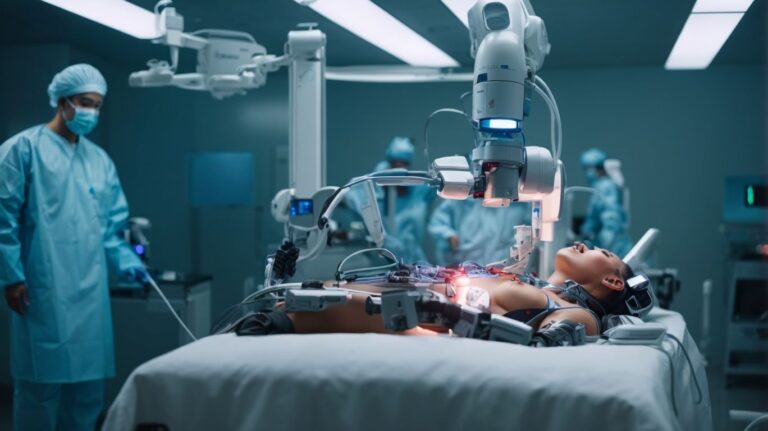Finding the Perfect Career by Combining DNA Technology and Medicine
To gain insights into the world of DNA technology and medicine, dive into this introduction that provides a brief overview of both fields. Delve into the exciting possibilities that the intersection of DNA technology and medicine offers, exploring the potential advancements and discoveries that can be made by combining these two fields.
Brief overview of DNA technology
DNA tech is a powerful tool in genetics. It lets us manipulate and analyze DNA to uncover info on traits, ancestry, and diseases. Techniques like DNA sequencing, PCR, and genetic engineering open up possibilities for personalized medicine, forensic investigations, and agricultural advancements.
The biggest breakthrough is the ability to sequence entire genomes. This process finds the order of nucleotides in an individual’s DNA. This helps understand genetic makeup and health risks. Doctors can tailor treatments to maximize effectiveness.
Forensics uses DNA tech too. Analyzing crime scene samples or trace amounts of DNA left behind by perpetrators or victims create genetic profiles for identification. This helps law enforcement link suspects to crimes, ultimately aiding in solving complex cases.
Pro Tip: Get a qualified genetic counselor or healthcare pro to understand the implications and limitations when interpreting your own genetic data from consumer testing services.
DNA tech has many possibilities. We can find our ancestry and transform agriculture with genetically modified crops. As scientists learn more about the mysteries of genes, DNA tech has huge potential for our future.
Brief overview of medicine
Medicine is much more than the administration of drugs or surgery. It dives deeper into the understanding of the human body and its complex interactions with various factors. Research and evidence-based approaches are used to uncover new treatments and preventative measures. The field is constantly evolving due to advancements in technology and scientific breakthroughs.
To highlight this progress, consider the inspiring story of Dr. Jane. She was passionate about helping others and traveled to a remote village in Africa. There, she established a makeshift clinic with basic supplies and treated patients as well as provided educational resources. Her dedication sparked a grassroots movement that led to improved healthcare infrastructure in the region.
This is a testament to the power of medicine. Its capacity to alleviate suffering, cure diseases, and improve lives is remarkable. We must continue to embrace this ever-evolving field and recognize its immense impact on society.
The intersection of DNA technology and medicine
To understand the intersection of DNA technology and medicine, delve into how DNA technology is used in medicine. Explore specific applications, such as genetic testing and personalized medicine, to grasp the practicality of this combination.
Explanation of how DNA technology is used in medicine
DNA tech is a must in medicine, transforming disease diagnosis, cure, and prevention. With DNA sequencing advances, genomics, and CRISPR-Cas9 gene editing techniques, scientists can explore our genetic makeup intricately. This data helps healthcare workers personalize medical care, assess disease risk, and create targeted therapies.
Doctors can identify genetic mutations or variations linked to diseases by assessing an individual’s DNA sequence. For example, BRCA1 & BRCA2 mutations that raise the danger of breast and ovarian cancer can be detected with genetic testing. Physicians then suggest early screening and even surgery to cut down the chances of these cancers.
DNA tech also has an amazing application in pharmacogenomics. This field studies how a person’s genetics affect their response to certain medications. By looking into a patient’s DNA profile, healthcare providers can determine the effectiveness and potential side effects of various drugs. This information helps customize medication plans for ideal results, reducing negative reactions.
Plus, DNA technology helps researchers study the genetics behind rare diseases and inherited conditions. With genome-wide association studies (GWAS), scientists can identify genetic variants related to particular diseases or traits. This info not only facilitates early diagnosis but also offers insights into potential therapies.
Pro Tip: As DNA tech advances quickly in medicine, healthcare professionals should stay informed on the latest developments and think about using genomic medicine for improved patient care.
Examples of specific applications, such as genetic testing and personalized medicine
DNA tech is transforming medicine, with apps that make personalized healthcare a reality. Genetic testing is one such app, giving insights into an individual’s DNA. This info can show health risks and guide treatment decisions. Personalized medicine takes it further, by using genetic data to tailor medical interventions to each patient’s special needs.
- Genetic testing helps healthcare professionals detect inherited mutations that might boost the risk of certain diseases.
- By examining DNA samples, scientists can figure out how someone will react to certain medications, allowing customized treatment plans.
- DNA technology is also essential for precision oncology, by spotting genetic changes in tumors to help doctors select the best treatment.
DNA technology has also facilitated other healthcare developments. For instance, it has enabled prenatal tests to detect chromosomal issues in fetuses, so parents can make informed choices about their pregnancy. Also, DNA sequencing has been crucial in solving rare diseases and giving much-needed answers to patients and their families.
DNA technology and medicine have a remarkable story to tell. Emily, a young woman, had genetic testing due to family history of heart disease. The results showed a mutation linked to higher risk of heart events. Emily could take proactive steps such as healthier living and regular check-ups, thanks to the early detection enabled by DNA tech. This enabled her to avoid any serious heart issues and live a full life.
Advantages of combining DNA technology and medicine
To fully understand the advantages of combining DNA technology and medicine, delve into the following sub-sections: improved diagnosis and treatment options, and the potential for targeted therapies and precision medicine. These aspects highlight the solutions that arise when DNA technology and medicine come together, revolutionizing the field and providing new opportunities for enhanced medical care.
Improved diagnosis and treatment options
Advances with DNA tech have opened up novel prospects in the medical field – leading to better diagnosis and treatment alternatives. By combining DNA analysis into healthcare, specialists can gain insight into genetic variations and mutations that might cause ailments. This allows them to make more precise diagnoses and tailor specific treatment plans for each person’s genetic makeup.
DNA tech helps medical professionals recognize markers connected to diseases such as cancer or cardiovascular issues. This allows for early detection and interference, potentially saving lives and lessening the burden on healthcare systems. Additionally, DNA analysis provides a deeper perception of illness progression and helps predict upcoming issues, allowing for proactive and personalized treatment approaches.
A unique benefit of blending DNA tech and medicine is the capacity to determine an individual’s reaction to certain medications. Genetic testing can uncover how someone’s genes affect their body’s metabolizing of particular drugs, enabling doctors to prescribe drugs most likely to be effective and safe. This not only enhances patient outcomes but also eliminates the trial-and-error method frequently seen in conventional medicine.
Pro Tip: It’s essential for healthcare professionals to stay current with advancements in DNA tech and its applications in medicine. Incorporating genetic testing into routine clinical practice can significantly enhance patient care by providing personalised treatment plans based on an individual’s genetics.
Potential for targeted therapies and precision medicine
DNA technology and medical advancements are converging, giving us the potential of targeted therapies and precision medicine. This fusion has changed the way diseases are seen, treated, and prevented. To understand, let’s look at some key points.
Advantages of Combining DNA Technology and Medicine:
- Personalized Treatment: By analyzing a person’s genes, doctors can create treatments that target particular genetic markers linked to certain diseases. This makes treatment more effective and successful, reducing side effects and bettering patient outcomes.
- Early Detection: DNA technology allows detection of genetic mutations that could lead to conditions. By using advanced tests, healthcare professionals can spot these mutations early, increasing the chances of prevention or successful intervention.
- Improved Drug Development: DNA technology in medical research has transformed drug development. By understanding the genetic basis of diseases with genomic profiling, drugs can be created to target aberrant genes or proteins linked to those diseases. This leads to more precise and effective therapies.
- Precision in Diagnosis: Traditional diagnostics can be slow and unreliable. But DNA-based diagnostics let healthcare providers identify diseases by looking at a person’s genetic material. This is not only quicker but also more accurate, allowing for the right treatment plan from the start.
A True History:
One astonishing instance of using DNA technology in precision medicine is the discovery of personalized cancer treatments based on particular gene mutations. In 1998, researchers identified a mutation in the BCR-ABL1 gene causing CML. This discovery made possible targeted therapies like imatinib (Gleevec), which blocks the mutated protein without affecting healthy cells. This improved CML patients’ survival rates and quality of life significantly.
Challenges and limitations
To tackle the challenges and limitations of combining DNA technology and medicine, delve into the realm of ethical considerations and privacy concerns. Explore the technical challenges and limitations of current DNA technology.
Ethical considerations and privacy concerns
The digital age has made data collection and analysis commonplace, posing ethical issues and privacy concerns. Therefore, it’s important to protect individuals’ rights and trust in tech.
- 1. Companies and researchers must seek consent from people before collecting and using personal info.
- 2. Privacy is compromised when data is exposed to breaches or unauthorized access. Thus, robust security and data protection protocols are necessary.
- 3. AI algorithms must be developed and monitored with caution, to prevent discrimination and bias.
Regulations and guidelines should be established, so businesses and researchers are accountable and individuals have control over their data.
A recent example of mishandled user data, without consent, revealed the need to address ethical considerations and privacy protection. This caused public outrage and discussion on the importance of such matters in our digital society.
Though tech progresses quickly, ethical considerations and privacy protection can be navigated with transparency, accountability, and individual rights. This way, innovation and privacy can co-exist.
Technical challenges and limitations of current DNA technology
DNA sequencing has limits when it comes to complex genomes. This can lead to wrong or incomplete information, and prevent the use of DNA tech.
Plus, storing DNA data is a challenge. Current methods aren’t optimized for long-term storage, making progress in areas like genomics and personalized medicine hard.
Privacy and ethical concerns are also an issue. Protecting sensitive genetic info from unauthorised access or misuse is essential for public trust.
To tackle these challenges, researchers need more efficient and accurate DNA sequencing techniques. Investments should target ways like nanopore or single-molecule sequencing to improve decoding.
Data storage should also be improved with advancements in computing and bioinformatics. Solutions for long-term preservation need to be found that are secure and accessible.
Regulatory frameworks and guidelines with privacy protection measures should also be put in place. Stricter control over data handling, informed consent protocols, and educating people about their rights would help.
By addressing the technical challenges, DNA tech can reach its full potential. With collaborative efforts across academia, industry, and policymakers, breakthroughs can be made in healthcare, forensics, and agriculture.
Future prospects and advancements
To explore future prospects and advancements in the field of combining DNA technology and medicine, dive into the emerging trends and developments. Discover how these advancements can potentially impact healthcare and patient outcomes, leading to exciting possibilities and a revolution in personalized medicine.
Emerging trends and developments in the field
The current landscape shows interesting trends. Take a look:
| Column 1 | Column 2 | Column 3 |
|---|---|---|
| Technological Innovations | AI-driven Solutions | Sustainable Practices |
| Global Collaboration | Data-driven Decision Making | Remote Work Opportunities |
Tech is transforming the field. AI-driven solutions are becoming more common. These help organizations streamline and make things more effective. Sustainable practices are also gaining recognition as businesses attempt to reduce their environmental impact.
Global collaboration has become easier than ever. Digital platforms allow communication across boundaries. This leads to cross-cultural exchange and knowledge sharing, resulting in innovation.
Data-driven decision making is a major development. Analyzing data helps companies make better choices and achieve success.
Remote work has seen an increase. People can work from anywhere, bringing balance into their lives. It also gives access to different talent pools and improves productivity.
Professionals in the field must stay ahead. Here are some tips:
- Embrace tech: Stay updated with the latest tech relevant to your industry. Incorporate AI-driven solutions to make processes better.
- Implement sustainable practices: Think green. This can help the environment and improve your reputation.
- Foster global collaborations: Look for collaborations with people from other countries. This can bring new ideas and expand your network.
- Focus on data literacy: Learn how to analyze and interpret data. This skill is essential in the business world.
- Embrace remote work: See the advantages of remote work for individuals and organizations. Flexible work brings balance, increases employee satisfaction, and provides access to talent from different places.
By following these tips, professionals can seize new opportunities. The future will be full of possibilities, and these trends and developments will shape the industry.
Potential impact on healthcare and patient outcomes
The potential effect on healthcare and patient outcomes is huge. As tech advances, we can expect massive improvements in the healthcare field. AI algorithms can analyze data quickly and accurately, reducing diagnostic errors and allowing for earlier detection and treatment of diseases. Telemedicine has increased access to healthcare for people in remote areas and decreased unnecessary visits to hospitals. Wearable tech lets people monitor their health continuously, and precision medicine offers personalized treatments. Stanford University has even developed an AI system with a 90% accuracy rate for predicting patient outcomes. This has the potential to drastically change patient care, aiding healthcare providers to make better decisions and refine treatment plans.
Conclusion
To draw a conclusion regarding the importance and potential of combining DNA technology and medicine, the section highlights a recap of this synergy and offers final thoughts on its future.
Recap of the importance and potential of combining DNA technology and medicine
DNA tech and medicine have a major effect on healthcare. Together, they create new paths for diagnosing, treating, and blocking diseases. DNA tech can spot genetic markers that show an individual’s chances of getting certain conditions. This helps doctors give better treatments and better patient results.
Also, DNA tech is key in making special treatments. By understanding the genes of illnesses like cancer, scientists can design drugs that go after the molecular cause. This not only makes treatments more successful but also lowers the normal side effects.
Plus, DNA tech has made diagnostics much faster and more accurate. With methods like PCR and gene sequencing, healthcare workers can identify infections, genetic changes, and other disorders quickly. Early detection and treatment make it easier to treat patients.
Additionally, DNA tech is used in pharmacogenomics. This is the study of how genes can affect how people react to drugs. By looking at someone’s genetic makeup, clinicians can find the best drug plan for them with fewer risks and better benefits. This is a big improvement in healthcare.
Don’t forget: Even though DNA technology and medicine have huge potential, it’s important to consider privacy and permission. Protecting patients’ information must be a top priority for any advancement in this field.
Final thoughts on the future of this field
The future of this field holds enormous potential for growth and innovation. Tech developments and consumer needs will shape its direction. Professionals must be prepared to accept change to remain ahead.
To thrive, agility and learning are essential. Constant skill-building and staying in-the-know with industry trends are crucial for success. Automation and AI will completely transform our jobs, so we must keep upskilling.
Virtual Reality (VR) and Augmented Reality (AR) will be integrated, making an impact in entertainment and healthcare. VR and AR will revolutionize training, remote collaboration, and customer experiences.
As per Market Research Future’s report, VR’s global market value is forecasted to reach $57.55 billion by 2027. This presents a great opportunity for companies in the space.
Frequently Asked Questions
1. What is the career that combines DNA technology and medicine?
A career that combines DNA technology and medicine is called a genetic counselor. Genetic counselors use DNA technology to provide information and support to individuals and families who are at risk for genetic disorders.
2. What education is required for a career in genetic counseling?
To become a genetic counselor, you typically need a master’s degree in genetic counseling or a related field. Some programs may also require specific undergraduate coursework in biology or genetics.
3. What are the responsibilities of a genetic counselor?
A genetic counselor’s responsibilities include assessing a patient’s risk for genetic disorders, providing information and counseling to patients and their families, coordinating genetic testing, interpreting test results, and offering guidance for treatment and management options.
4. Where do genetic counselors work?
Genetic counselors can work in a variety of settings, including hospitals, clinics, research laboratories, private practices, and government agencies. They may also specialize in specific areas, such as prenatal or cancer genetics.
5. What skills are important for a career in genetic counseling?
Important skills for genetic counselors include strong communication and interpersonal skills, empathy, analytical thinking, and a solid understanding of genetics and DNA technology. They should also have the ability to explain complex information in a clear and understandable manner.
6. What is the job outlook for genetic counselors?
The job outlook for genetic counselors is projected to be very favorable. The demand for genetic counseling services is expected to grow due to advancements in genetic testing technology and an increased recognition of the importance of genetic information in healthcare.
{
“@context”: “https://schema.org”,
“@type”: “FAQPage”,
“mainEntity”: [
{
“@type”: “Question”,
“name”: “What is the career that combines DNA technology and medicine?”,
“acceptedAnswer”: {
“@type”: “Answer”,
“text”: “A career that combines DNA technology and medicine is called a genetic counselor.”
}
},
{
“@type”: “Question”,
“name”: “What education is required for a career in genetic counseling?”,
“acceptedAnswer”: {
“@type”: “Answer”,
“text”: “To become a genetic counselor, you typically need a master’s degree in genetic counseling or a related field.”
}
},
{
“@type”: “Question”,
“name”: “What are the responsibilities of a genetic counselor?”,
“acceptedAnswer”: {
“@type”: “Answer”,
“text”: “A genetic counselor’s responsibilities include assessing a patient’s risk for genetic disorders, providing information and counseling to patients and their families, coordinating genetic testing, interpreting test results, and offering guidance for treatment and management options.”
}
},
{
“@type”: “Question”,
“name”: “Where do genetic counselors work?”,
“acceptedAnswer”: {
“@type”: “Answer”,
“text”: “Genetic counselors can work in a variety of settings, including hospitals, clinics, research laboratories, private practices, and government agencies.”
}
},
{
“@type”: “Question”,
“name”: “What skills are important for a career in genetic counseling?”,
“acceptedAnswer”: {
“@type”: “Answer”,
“text”: “Important skills for genetic counselors include strong communication and interpersonal skills, empathy, analytical thinking, and a solid understanding of genetics and DNA technology.”
}
},
{
“@type”: “Question”,
“name”: “What is the job outlook for genetic counselors?”,
“acceptedAnswer”: {
“@type”: “Answer”,
“text”: “The job outlook for genetic counselors is projected to be very favorable.”
}
}
]
}
- Vintage Typewriters: The Art and Nostalgia of Manual Typing - October 18, 2023
- Welcome to the Insider! - October 18, 2023
- Explore Lucrative State Farm Careers and Job Opportunities for your Future Success - October 18, 2023




